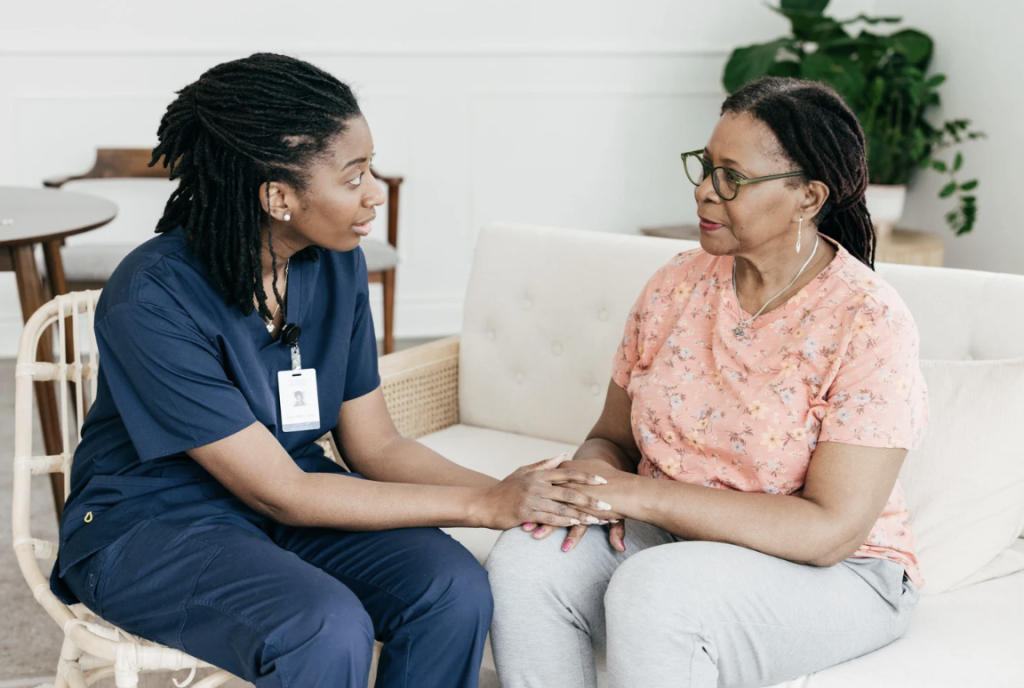Whole-Person Care for Seniors
In senior living communities, quality care means looking beyond the immediate physical needs of residents. True wellness requires an integrated approach that addresses behavioral health alongside physical health. This combination supports not just longevity, but quality of life, emotional resilience, and social connection.
At Courtyard Manor, we believe that behavioral health and physical health care are not separate priorities. They are deeply interconnected parts of a resident’s overall well-being. By integrating them, we ensure that seniors receive the compassionate, holistic care they deserve.
Understanding Behavioral Health in Seniors
Behavioral health refers to the connection between behaviors, emotions, and overall mental well-being. It includes conditions such as depression, anxiety, substance use, and cognitive decline, as well as the mental health impacts of chronic illness and life changes.
For seniors, behavioral health needs can be triggered or worsened by:
- Isolation and loneliness
- Loss of mobility or independence
- Chronic health conditions
- Bereavement and life transitions
- Cognitive decline or dementia
While these challenges are common, they are not inevitable. With early intervention, compassionate support, and a care environment that treats mental and emotional needs as seriously as physical ones, seniors can maintain a stronger sense of purpose and joy.
The National Institute of Mental Health notes that nearly 20% of adults aged 55 and older experience some type of mental health concern, yet these issues often go undiagnosed or untreated.
The Link Between Behavioral and Physical Health
It’s no secret that our minds and bodies are connected, but the relationship is even more pronounced in older adults. Untreated behavioral health conditions can worsen physical conditions, and physical health challenges can contribute to mental strain.
For example:
- Depression can increase the risk of heart disease and weaken the immune system.
- Chronic pain can contribute to anxiety and social withdrawal.
- Cognitive decline can lead to frustration, mood changes, and decreased activity levels.
By addressing both areas together, senior living communities can improve treatment outcomes, reduce hospitalizations, and promote a better quality of life.
What Integration Looks Like in Senior Living
Integrating behavioral health and physical health care means building a coordinated approach where care teams communicate, share information, and design individualized plans that address all aspects of a resident’s well-being.
At Courtyard Manor, this may involve:
- Regular screenings for depression, anxiety, and cognitive changes alongside physical check-ups
- Care teams that include nurses, physicians, mental health professionals, and activity coordinators
- Activities that promote both physical movement and mental engagement
- Support groups and counseling opportunities for residents
- Education and resources for families to understand behavioral health changes
This type of integration ensures that no part of a resident’s health is overlooked.
The Role of Social Engagement
Social interaction plays a vital role in both physical and behavioral health. In fact, meaningful relationships and community involvement have been shown to reduce depression, lower blood pressure, and improve cognitive function in seniors.
Senior living communities can foster this connection through:
- Group activities like exercise classes, music therapy, and gardening
- Shared mealtimes that encourage conversation
- Celebrations and events that bring residents together
- Volunteer and intergenerational programs to connect with the wider community
The goal is to create an environment where residents feel valued, supported, and connected, because loneliness can be just as damaging as a chronic illness.
Benefits of an Integrated Care Approach
When behavioral health and physical health are addressed together, seniors experience:
- Better overall health outcomes due to coordinated care plans
- Reduced hospitalizations and ER visits
- Improved emotional well-being and sense of purpose
- Greater independence and confidence in daily living
- Enhanced quality of life through a balance of care and personal freedom
For families, this approach offers peace of mind, knowing their loved one’s care addresses the full picture, not just one part of it.
How Families Can Support Integration
Families are an important part of the care team, even in a senior living setting. You can help support integration by:
- Sharing any concerns about mood, behavior, or activity level with staff
- Attending care plan meetings and asking about behavioral health support
- Encouraging your loved one to participate in social and physical activities
- Being present and engaged during visits, providing emotional reassurance
Caring for the Whole Person
Integrating behavioral health and physical health care in senior living is essential to helping older adults live well. By treating the mind and body as equally important, we can promote resilience, reduce preventable health issues, and ensure that seniors feel supported in every aspect of their lives.
At Courtyard Manor, this approach is part of who we are. Our residents benefit from compassionate care teams, enriching daily activities, and a community that values both health and happiness.
If you’re exploring senior living options that prioritize whole-person care, schedule a tour with Courtyard Manor today and see how we can support your loved one’s journey.

